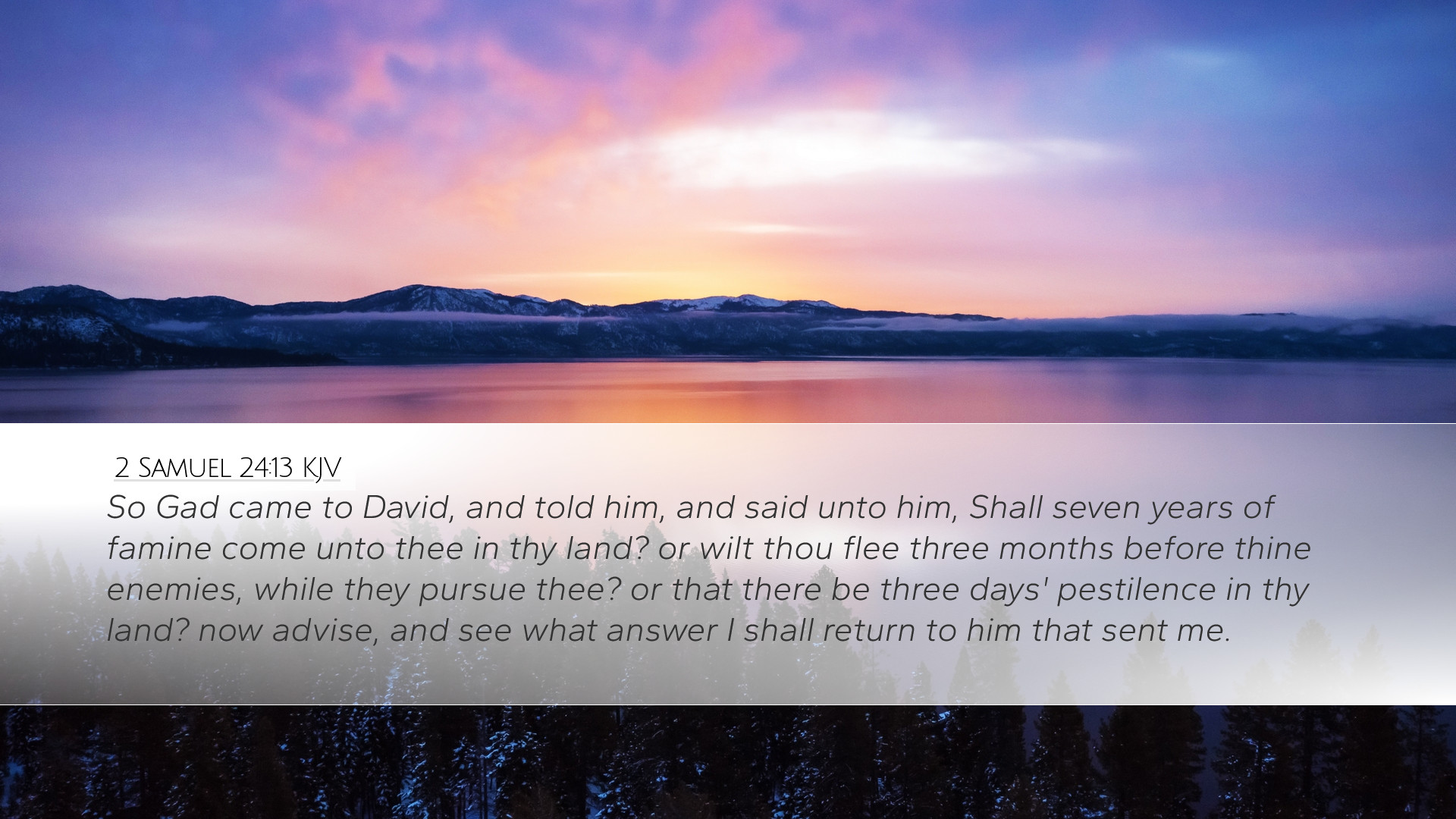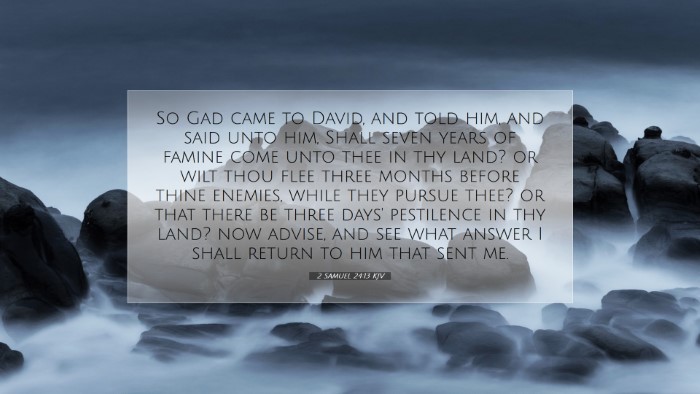Commentary on 2 Samuel 24:13
In 2 Samuel 24:13, we find the narrative of King David’s pivotal decision following a census—an act that stirred God’s anger. This verse provides a critical point of reflection on divine providence, human fallibility, and the weight of leadership. The verse reads:
"So Gad came to David and told him, and said unto him, Shall seven years of famine come unto thee in thy land? Or wilt thou flee three months before thine enemies, while they pursue thee? Or that there be three days’ pestilence in thy land? Now advise, and see what answer I shall return to him that sent me."
Contextual Analysis
The surrounding context of this verse reveals a situation of national crisis due to David's decision to conduct a census. The act is significant as it reflects David’s reliance on numbers rather than on God for assurance of his rule and military strength. This misstep drew God's ire and led to a subsequent choice for punishment from which David must choose a consequence.
Insights from Matthew Henry
Matthew Henry emphasizes the gravity of choices made by leaders and the inherent responsibility that accompanies them. He notes:
- The census itself was an indication of David's waning faith, indicating a reliance on numerical strength rather than divine sovereignty.
- Henry illustrates the painful irony of leadership: despite wealth and power, leaders are often faced with dire consequences for their actions that affect their whole nation.
- The three choices presented to David highlight God's hand in both mercy and judgment. Each option forces David to confront both the consequences of his sin and the nature of sin itself.
Insights from Albert Barnes
Albert Barnes provides a deeper exploration of the choices laid before David:
- He delineates how each of the three alternatives given by God through the prophet Gad serves to invoke fear and urgency within David’s heart.
- Barnes points out that while each judgment is severe, it also reflects the covenant nature of God. The options serve to remind David of his failings as a leader and his need for divine mercy.
- The emphasis on 'famine,' 'enemies,' and 'pestilence' showcases the spectrum of God’s judgment and illustrates the comprehensive nature of divine authority over all aspects of life.
Insights from Adam Clarke
Adam Clarke approaches this verse by examining the psychological and spiritual implications of the choices offered to David:
- Clarke discusses the concept of divine communication through the prophet, underscoring the weight of prophetic utterance as it demands both response and accountability from David.
- He also notes that the severity of the punishments offered serves as a reminder of God’s perfect justice and holiness, contrasting human weakness and failure.
- Clarke highlights the significance of David’s role as an intercessor, which later plays a vital role in forgone consequences when he pleads with God, demonstrating the power of repentance and supplication.
Theological Implications
The choices in 2 Samuel 24:13 raise significant theological questions about:
- Divine Sovereignty: How does God's sovereignty manifest in human affairs, particularly in the lives of leaders?
- Human Responsibility: What does this episode teach about the responsibilities of those in power and the accompanying risks of pride and self-reliance?
- The Nature of Judgment: The various forms of judgment illustrate divine justice, raising questions on how God disciplines His people and offers them a choice for repentance.
- The Role of Prophets: The prophet Gad’s role as a mediator signifies the importance of prophetic voices in guiding and challenging leaders towards righteousness.
- Repentance and Mercy: David’s eventual choice reflects a deeper understanding of repentance and the recognition of divine mercy amid consequences.
Conclusion
The message of 2 Samuel 24:13 is profound for all who seek to understand the dynamics of leadership, the weight of sin, and the mercy of God. For pastors, students, theologians, and scholars alike, this passage serves as a reminder of the serious implications of one’s choices and the profound grace available through repentance and supplication. The verse calls to multifaceted reflection on what it means to lead under God’s authority and how to reconcile human failings with divine mercy.


